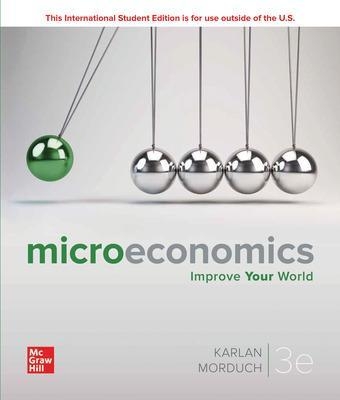
ISE Microeconomics
McGraw-Hill Education (Verlag)
978-1-260-56664-2 (ISBN)
- Titel z.Zt. nicht lieferbar
- Versandkostenfrei innerhalb Deutschlands
- Auch auf Rechnung
- Verfügbarkeit in der Filiale vor Ort prüfen
- Artikel merken
- Using a balanced approach, students are able to sharpen their own understanding of topics by focusing on the data and evidence behind the effects they see. Students are equipped to understand and respond to real-life situations thought their new economic lens and challenged to decided how they will improve their world.
- The third edition delivers core economic concepts along with exciting new ideas in economic though and strives to keep students engaged by confronting issues that are important in the world.
- This text combines a familiar curriculum with material from new research and applied areas such as finance, behavioral economics, and the political economy. Students and faculty will find content that breaks down barriers between what takes place in the classroom and what happens in our nation and our world, with applications that are driven by empirical evidence, data, and research.
- Karlan and Morduch show students that economics is a tool to improve one's own life and promote better public and business policies in the world. At the same time, this third edition challenges students to reach their own conclusions about how they will improve their world.
Dean Karlan is Professor of Economics and Finance at Northwestern University and President and Founder of Innovations for Poverty Action (IPA). Dean started IPA in 2002 with two aims: to help learn what works and what does not in the fight against poverty and other social problems around the world, and then to implement successful ideas at scale. IPA has worked in over 50 countries, with 1,000 employees around the world. Dean’s personal research focuses on using field experiments to learn more about the effectiveness of financial services for low-income households, with a focus on using behavioral economics approaches to improve financial products and services. His research includes related areas, such as building income for those in extreme poverty, charitable fund-raising, voting, health, and education. Dean is also co founder of stickK.com, a start-up that helps people use commitment contracts to achieve personal goals, such as losing weight or completing a problem set on time, and in 2015 he founded Impact Matters, an organization that helps assess whether charitable organizations are using and producing appropriate evidence of impact. Dean is a Sloan Foundation Research Fellow, a Guggenheim Fellow, and an Executive Committee member of the Board of the M.I.T. Jameel Poverty Action Lab. In 2007 he was awarded a Presidential Early Career Award for Scientists and Engineers. He is co editor of the Journal of Development Economics and on the editorial board of American Economic Journal: Applied Economics. He holds a BA from University of Virginia, an MPP and MBA from University of Chicago, and a PhD in Economics from MIT. In 2016 he coauthored Failing in the Field, and in 2011 he coauthored More Than Good Intentions:Improving the Ways the World’s Poor Borrow, Save, Farm, Learn, and Stay Healthy. Jonathan Morduch is Professor of Public Policy and Economics at New York University’s Wagner Graduate School of Public Service. Jonathan focuses on innovations that expand the frontiers of finance and how financial markets shape economic growth and inequality. Jonathan has lived and worked in Asia, but his newest book, The Financial Diaries: How American Families Cope in a World of Uncertainty (written with Rachel Schneider and published by Princeton University Press, 2017), follows families in California, Mississippi, Ohio, Kentucky, and New York as they cope with economic ups and downs over a year. The new work jumps off from ideas in Portfolios of the Poor: How the World’s Poor Live on $2 a Day (Princeton University Press, 2009), which Jonathan coauthored and which describes how families in Bangladesh, India, and South Africa devise ways to make it through a year living on $2 a day or less. Jonathan’s research on financial markets is collected in The Economics of Micro-finance and Banking the World, both published by MIT Press. At NYU, Jonathan is executive director of the Financial Access Initiative, a center that supports research on extending access to finance in low-income communities. Jonathan’s ideas have also shaped policy through work with the United Nations, World Bank, and other international organizations. In 2009, the Free University of Brussels awarded Jonathan an honorary doctorate to recognize his work on micro-finance. He holds a BA from Brown and a PhD from Harvard, both in Economics.
Chapter 1: Economics and Life
Chapter 2: Specialization and Exchange
Chapter 3: Markets
Chapter 4: Elasticity
Chapter 5: Efficiency
Chapter 6: Government Intervention
Chapter 7: Consumer Behavior
Chapter 8: Behavioral Economics: A Closer Look at Decision Making
Chapter 9: Game Theory and Strategic Thinking
Chapter 10: Information
Chapter 11: Time and Uncertainty
Chapter 12: The Costs of Production
Chapter 13: Perfect Competition
Chapter 14: Monopoly
Chapter 15: Monopolistic Competition and Oligopoly
Chapter 16: The Facts of Production
Chapter 17: International Trade
Chapter 18: Externalities
Chapter 19: Public Goods and Common Resources
Chapter 20: Taxation and the Public Budget
Chapter 21: Poverty, Inequality, and Discrimination
Chapter 22: Political Choices
Chapter 23: Public Policy and Choice Architecture
| Erscheinungsdatum | 01.11.2019 |
|---|---|
| Zusatzinfo | 251 Illustrations |
| Verlagsort | OH |
| Sprache | englisch |
| Maße | 198 x 249 mm |
| Gewicht | 1107 g |
| Themenwelt | Wirtschaft ► Volkswirtschaftslehre ► Mikroökonomie |
| ISBN-10 | 1-260-56664-1 / 1260566641 |
| ISBN-13 | 978-1-260-56664-2 / 9781260566642 |
| Zustand | Neuware |
| Haben Sie eine Frage zum Produkt? |
aus dem Bereich


